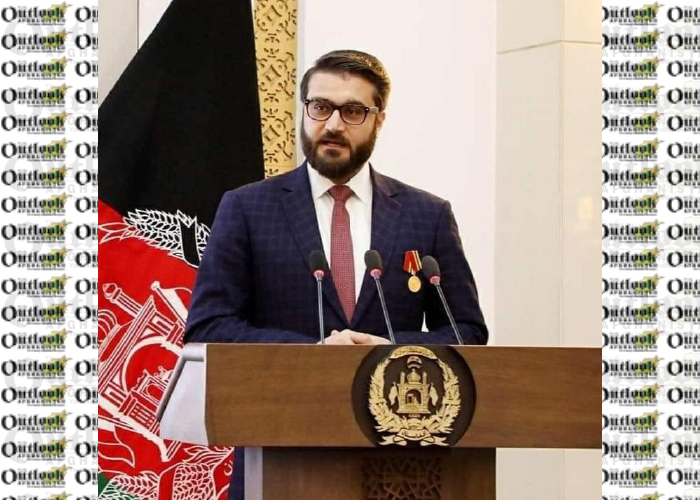KABUL - President Ashraf Ghani’s National Security Adviser Hamdullah Mohib at a press conference on Saturday said that the president will not be influenced by any type of political pressure unless an agreement is made for bringing real peace to Afghanistan.
“We assure our people that we will not bow to pressure," Mohib said. "Our objective is to achieve peace. The government has got responsibility towards the people and that is to ensure restoring a true peace in Afghanistan."
In response to critics that the government was creating barriers in the way of peace, Mohib said: “This government was elected by the people, the people have cast their ballots that will be okay, but the government does not have the right to bestow this right to the 40 people to decide about the future of Afghanistan."
"We have experienced such governments in the past. Agreement was made between some people, but it had not led to a positive result for the Afghan people,” said Mohib.
Meanwhile, President Ghani in a meeting with a number of foreign ambassadors in Kabul discussed the peace process.
Referring to Ghani’s previous statement about the possibility of an early election as a result of a peace agreement, Mohib said that Ghani will not run for president if there is an early election.
“If the main purpose is peace and formation of an elected government, the president made it clear several times in his remarks that we are ready to go for an early election maybe in three months, six months or according to the timeline that is needed and the president himself will not be a candidate in such an election, but if the purpose is only to form an interim government, in that scenario, I think the people of Afghanistan will not support it,” Mohib explained.
The statement comes at a time that a UN-led peace conference on Afghanistan is expected to be held in Turkey with some political leaders describing it a destiny-making conference for a negotiated settlement to the conflict in Afghanistan.
Mohib said that so far no agreement has been made on the agenda and timeline of the conference in Turkey.
At the presser, Acting Minister of Defense Gen. Yasin Zia and the head of the Afghan intelligence agency Ahmad Zia Saraj said that the Taliban are still getting support from Pakistan and the entire world knows about their sanctuaries in that country.
“In the trilateral meetings, their elders including Bajwa (Pakistan’s army chief Qamar Jawed Bajwa) and the head of ISI (Pakistan’s intelligence agency) have said that they have ties with them (the Taliban). If Taliban today claims to have training bases in Afghanistan, it is just because they want to decrease international pressure on them (Pakistan),” Zia said.
Zia stated that the Taliban are using the civilian population as human shields for their "atrocities."
“Taliban’s treatment centers, funding sources, and training centers exist in Pakistan,” added Zia.
Confirming Zia’s statement on the Taliban’s game of decreasing pressure on Pakistan by portraying that they have military camps inside Afghanistan, Saraj said that the Taliban by such moves try to mislead the international community.
“The Taliban is not able to establish or form bases here, however, they plan to reshuffle their bases in the future to help decrease pressure on Pakistan because Pakistan is being criticized in every meeting due to the presence of Taliban and their leaders there,” said Saraj.
In response to a question about the targeted killings in the country, Saraj said that the Taliban are behind these attacks.
“We cannot draw a line between the terrorist groups because one day they appear in the shape of Taliban, then Daesh and Lashkar-e-Tayyeba, but the main actor behind them are Taliban,” Saraj said.
This comes as Human Rights Watch has accused the Taliban of "deliberately targeting journalists and other media workers, including women," in Afghanistan, saying that such attacks and threats have increased sharply since the start of the talks between the Afghan government and the Taliban in Doha.
The watchdog says these attacks increase concerns about preserving freedom of expression and the media in any peace settlement.
Human Rights Watch (HRW) says it has found that “the Taliban commanders and fighters have engaged in a pattern of threats, intimidation, and violence against members of the media in areas where the Taliban have significant influence, as well as in Kabul.”
According to HRW’s findings, a journalist covering the fighting in Helmand province said that one of his sources told him the Taliban were looking for him and he should lie low. “The majority of Afghan journalists feel intimidated and threatened,” he said. “All the journalists are scared because everyone feels like they could be next.” (TOLO NEWS)
Home » Afghanistan » President Ghani Will Not Bow to Pressure Without Real Peace: Mohib
President Ghani Will Not Bow to Pressure Without Real Peace: Mohib

